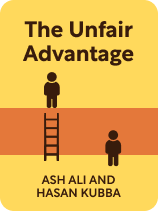

This article is an excerpt from the Shortform book guide to "The Unfair Advantage" by Ash Ali and Hasan Kubba. Shortform has the world's best summaries and analyses of books you should be reading.
Like this article? Sign up for a free trial here .
Do you have an idea for a business? How can you tell if it’s a viable one?
Ash Ali and Hasan Kubba say you don’t need to come up with anything spectacular. A viable business idea should build on your unique strengths, or “unfair advantages,” and offer value to people’s lives.
Keep reading to learn how to evaluate business ideas.
Evaluating Business Ideas
Once you’ve chosen the type of startup you want to launch, you should carefully consider which business idea to pursue. Ali and Kubba say your idea doesn’t need to be revolutionary; you just need to execute it well and use your unfair advantages to get an edge. You can build a successful business simply by improving upon an existing product or service. And, remember, sometimes success comes down to getting the timing right. Capitalizing on a growing trend often facilitates success even when your business idea isn’t notably original.
Ali and Kubba provide advice on how to come up with new ideas. Then, they offer guidance on how to evaluate business ideas you generate.
| How to Tell If You’ve Got a Great Business Idea Most business leaders agree with Ali and Kubba that your business idea doesn’t need to be completely original. But if it’s not original and revolutionary, how do you know whether your idea is good? Here are some indicators that experts suggest you check: You can sell at a reasonable price and make a good profit. Your business idea has to make sense for your customer and your profit margin. It’s hard to copy. Explore protective legal steps, such as patents, to make it harder for others to copy your product or idea. You believe in the difference it’ll make. No matter how profitable an idea promises to be, if it goes against your values, it’s not worth it. You need to be passionate about your business to stick with it for the long haul. People you trust—and people you don’t know—say it’s a good idea. Pay the closest attention to people’s immediate gut reactions, which generally reveal the most about their authentic feelings. It’s easy to understand. If you can easily explain your idea and why it’s important, you’re more likely to succeed with prospective customers and investors. |
To come up with a good business idea, Ali and Kubba recommend thinking creatively about how you can solve a problem in a unique way that somehow adds value to people’s lives. For example, you could create tires that last twice as long as competitors’ tires or build a transcription app that’s more accurate and sensitive to regional accents than other apps on the market. To generate ideas, Ali and Kubba suggest talking to people about things they find frustrating or products they wish they had. Also, reflect on problems you encounter routinely. Your life experiences are an excellent source of insight.
(Shortform note: Ali and Kubba recommend generating ideas by paying closer attention to your problems and the problems of others. Some business experts claim that the most effective way to stay tuned into these kinds of opportunities is by practicing meditation. Meditation can help calm your thoughts and make you more present and attentive to the people and circumstances around you. When you’re more present, you’re more likely to tap into the inspiration required for creative thinking. Also, consider how to improve the customer experience for a segment of the market. For example, you could explore offering travel advice to LGBTQA+ customers who have concerns about safety that other businesses don’t take into account.)
Once you have a business idea, Ali and Kubba say you must ensure that it fits two essential criteria: 1) enough people want and will pay for your proposed service or product, and 2) your unfair advantages match up well with your idea. For example, if you want to design the longest-lasting tires on the market, but you don’t have any technical or engineering expertise related to tire tread and wear, you probably want to consider another business idea (unless you have an extraordinary business partner to fill that role, which we’ll discuss in the next section).
(Shortform note: As Ali and Kubba assert, it’s crucial to ensure that there’s sufficient demand for your business idea. According to research, 42% of businesses fail because there’s no market need. How can you estimate demand? One way is to distribute surveys to potential customers or conduct focus groups. You can also access publicly available market data on distinct industries. For example, Pew Research Center shares data from public opinion polls, demographic research, and other social science research. A simple strategy that Chris Guillebeau suggests in The $100 Startup is to research keywords on popular search engines to see how many people are interested in a given product.)
| When You Don’t Have the Right Unfair Advantages Although Ali and Kubba say it’s important to make sure your business idea matches your unfair advantages, some highly successful entrepreneurs have achieved success without clear alignment between their initial unfair advantages and their business ventures. For example, Peter Kelly owns four successful restaurants and a catering business with combined annual sales or roughly $10 million. He never went to culinary school or even graduated from college, and he grew up in public housing as one of 12 siblings. He attributes his success to a strong work ethic and high self-confidence. So, you shouldn’t necessarily limit yourself to business ideas that intuitively align with your obvious advantages. |
Exercise: How Viable Is Your Business Idea?
Ali and Kubba say a good business idea solves a problem that you’re passionate about and matches your unfair advantages.
- Briefly describe one business idea you’ve been considering. What problem does it solve? Who’s your target audience?
- What clues have you gotten that there’s sufficient demand for your idea? For example, maybe you’ve observed people struggling with a routine task, or you’ve been frustrated by a subpar product or service.
- Which unfair advantages do you have that will help you achieve success with this idea? Write down two or three ways you can leverage each unfair advantage to advance your idea.
- What competition exists for your idea? How can you stand out from the competition?

———End of Preview———
Like what you just read? Read the rest of the world's best book summary and analysis of Ash Ali and Hasan Kubba's "The Unfair Advantage" at Shortform .
Here's what you'll find in our full The Unfair Advantage summary :
- The guidebook you need if you're planning to start a business
- How to find and use your unfair advantages (everybody has some)
- The steps you must take to achieve startup success






